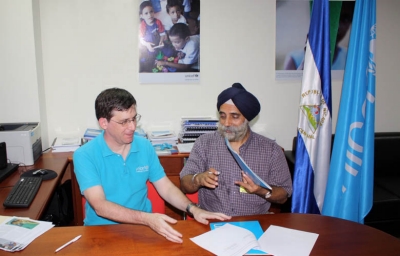Villanova University Establishes Formal Partnership with UNICEF Nicaragua

UNICEF, Nicaragua representative Philippe Barragne-Bigot signs the UNICEF-Villanova agreement with Dr. Pritpal Singh, professor and chair, Department of Electrical and Computer Engineering.
On October 21 in the capital city of Managua, the United Nations Children’s Fund (UNICEF), Nicaragua signed a cooperation agreement with Villanova University. Spearheaded by Electrical and Computer Engineering Department Chair Dr. Pritpal Singh, the partnership will provide opportunities for students and professors across the University to participate in projects related to many areas of common interest, including health, telemedicine, entrepreneurship, education and social programs. Given UNICEF’s mission of working with others to “overcome the obstacles that poverty, violence, disease and discrimination place in a child’s path,” much of the work will be focused on indigenous populations on the Caribbean coast of Nicaragua, where poverty is widespread and services are lacking.
Bluefields, the capital of Región Autónoma del Atlántico Sur—R.A.A.S. (Regional Autonomous Atlantic South), is one of the areas of greatest need. “From roads to communications, the region’s infrastructure is limited,” explains Dr. Singh. “Many children won’t go to school because often there are no working toilets, and some buildings have no running water.” UNICEF is working with the schools, local sanitation services and the health ministry to develop an SMS system whereby parents and children can alert the sanitation department using a basic cell phone to send a text message when facilities are not functional.
The region also is struggling to establish a business community, and lacks entrepreneurial guidance. “The Bluefields Indian and Caribbean University (BICU) serves the indigenous people of the area, but has few resources,” says Dr. Singh. The University is interested in creating an innovation lab, but with faculty who hold no advanced degrees and are poorly paid and unmotivated, it is difficult to launch new programs. In Managua, students at American College have developed a business/entrepreneurial club, and UNICEF is working with them on a “sociopreneurship” program to mentor disadvantaged youth and help them start businesses.
In addition to infrastructure and education, other areas of need include health services. Nicaragua’s Ministry of Health has expressed interest in expanding the Nova Mobile Health program to the Bluefields region, but acknowledges that there will be technical and cultural challenges, including limited cellular coverage and the prevalence of shaman doctors.
Dr. Singh summarizes the areas in which he believes Villanova can offer the most assistance:
1. Offering technical support, software development and training to develop systems of communication
2. Providing entrepreneurial workshops and mentoring
3. Connecting with students and faculty at BICU to improve the quality of education
In March 2015, the University’s spring break service trip to Nicaragua will include a visit to Bluefields where Villanova students will meet with those at BICU to determine how the two schools might work together. “We are looking forward to the opportunity to assist in supporting the programs and initiatives that UNICEF’s country office is working on,” says Dr. Singh. He thanks Rinko Kinoshita, deputy representative of UNICEF Nicaragua, for organizing many productive meetings during Dr. Singh’s October visit. “I am delighted that UNICEF, Nicaragua is as excited about working with us as we are with them.”
